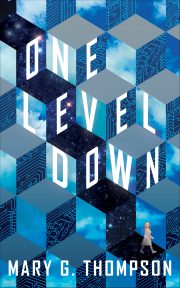Marketing, Sales, and Publicity–Part One: The Basics
by Monica Valentinelli
 Marketing is, and has been, a hot topic for authors these past few years. This two-part article seeks to remove the mysticism from the subject so you can make better decisions about your career.
Marketing is, and has been, a hot topic for authors these past few years. This two-part article seeks to remove the mysticism from the subject so you can make better decisions about your career.
As the publishing industry continues to shift and change, a lot of controversy has bubbled up over what authors “should” be doing with respect to marketing. From buzzwords like “platforms” to the push for social media usage, there’s no shortage of discussion to be found.
Even though it may “feel” easy to understand, the field requires constant attention and, for some, has a high learning curve. Often, the only time we “see” marketing is when the publisher’s efforts – a publicity campaign for a book – are visible to the reader, reviewer, or author who wrote it. Dig deeper and you’ll find that word choice is crucial here – especially for those of us who have worked in marketing and sales professionally or who have first-hand experience in the industry.
From my perspective, many authors aren’t concerned about marketing per se, but publicity. Understanding the differences between those two words may help you better understand what value your publisher has, what tasks you want to tackle yourself, what you may want to hire someone else to do, and how much time and money you want to devote to each.
Basic Definitions
Let’s start with the basics. What is marketing? Marketing is a field designed to promote a brand or products with the intent to sell and/or bring awareness about both. A company’s budget often dictates what resources they can devote to marketing a particular product, event, or brand. Sometimes, marketing and sales will be combined into one department or even a single position; marketing tasks can also be outsourced, depending upon the project. This is especially true for companies trying to save money on personnel, are short-staffed, or for those who need specialists.
Even though marketing and sales can be lumped together, they are also distinct, regardless if they’re combined into the same person’s role or department. Here again, size matters. Smaller companies may not have a designated “sales and marketing” employee let alone an entire team; other, larger businesses may have separate, but complimentary, departments with dozens of personnel. While the structure of positions and departments will vary from company to company (and vertical to vertical), the basic concept I’m trying to relay here is this: marketing and sales are connected to one another but also operate independently, even during a tightly-scheduled sales cycle.
What then, does marketing typically include? In my mind, the field boils down to the reliance on one word: data. When a marketer gets their hands on a product, they typically leverage research, testing, and experience to build necessary characteristics of a product in order to market it. Regardless of what’s being marketed, those characteristics require a number of decisions before any other actions are taken. Hard data from similarly-marketed products and, possibly, tests like A/B splits or focus groups help facilitate those choices.
Marketing Versus Publicity
Below, Nick Mamatas describes the difference between marketing and publicity. Pay attention to the characteristics he names with respect to marketing a book.
“Marketing and publicity are different, but related activities. Marketing is primarily to the trade and the media: what genre is the book (meaning what shelf will it be on), what does it say on the tip sheet, do you get half a page or a full page on the catalog, at the sales conference is the person talking about your book excited or just pretending to be excited, how many review copies are going out, and to whom, will there be YouTube ads and such, that sort of thing. Publicity is about putting the author in front of people—convention appearances, readings, blog tours, Twitter and blogging and the rest of the so-called “platform.” It’s about moving books from the shelf or retailer warehouse into the hands of readers, using the author as the conduit.” – Nick Mamatas, author and editor of Haikasoru, an imprint dedicated to Japanese SF in translation.
Book publicity, as Mamatas described, is a way to help readers connect to the author in order to sell books. Publicity campaigns and book publicists are supposed to help the author become more visible in the hopes that an author-to-reader connection will positively impact sales, either directly or indirectly. The effect on sales can be measured via standard conversion formulas, but it’s almost impossible to do if the publicist or author doesn’t have the basic data required to calculate it. Sales data, coupled with conversion, often drives marketing budgets. In my experiences, asking for the sale is what makes a lot of authors uncomfortable about publicity. As a result, some promote for the sake of promoting, but to their detriment forget to (or are embarrassed to) ask for that next piece.
Other marketing-related tasks may include: market research, segmentation, customer profiling, product placement, market positioning, reviews… The list goes on and on. The important thing to keep in mind here, however, is that a lot of these activities may not always be visible to you (the author) or the reader. The same can be true of publicity-related tasks, too. Just because you can’t “see” what a publisher is doing for your book, doesn’t mean that they aren’t marketing it.
In Marketing, Sales, and Publicity. Part Two: Topics in Publicity, I’ll share with you more information about book publicity, what publicists do, and close with some thoughts about marketing.
•••
Monica Valentinelli is a writer, editor, game designer, and consultant. Described as a “force of nature” by her peers, Monica is best known for her work in the horror, dark fantasy, and dark science fiction genres and has over thirty stories and games published through 2012. In addition to her creative credits, Monica has over ten years marketing experience and has worked behind-the-scenes with businesses large and small. For more about Monica, visit http://www.mlvwrites.com


